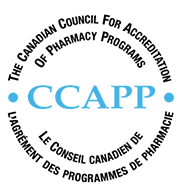In recent years, CCAPP has selectively offered “International” Accreditation services to universities with professional degree programs in pharmacy and to college institutions training pharmacy technician students outside of Canada. CCAPP adds the term “International” to any accreditation conferred to a school of pharmacy based outside of Canada to differentiate this from the CCAPP accreditation conferred to Canadian pharmacy programs due to the differences in scope of practice, entry to practice competencies pharmacy laws and regulations, and in the practice experiences of the students. Further, CCAPP has developed and implemented the use of specific International Accreditation Standards and Guidelines for the First Professional Degree in Pharmacy Programs 2017 (revised, July 2020) to address these differences.
International Programs
History and Implications
Implications for International Graduates for Licensure in Canada
Graduates from an educational institution which has an International CCAPP Accreditation status does not provide direct access to licensure in Canada. Graduates of these programs must meet the requirements for internationally educated pharmacists which are outlined at Pharmacists’ Gateway Canada.
Criteria for International Accreditation Requests
In assessing requests by international programs for assistance from CCAPP to perform any form of service, the CCAPP Board has established the following criteria that may be applied:
- The country of the requesting institution must have established diplomatic relations with Canada. For some countries, economic, trade, or other forms of exchange or cooperation agreements with Canada or a province of Canada should be in place.
- The principal purpose of the request from an international university/college should be to advance the quality of pharmacy education at the university, college or country to a model of pharmacy education in Canada. Requests that are made primarily for the purpose of facilitating graduates to immigrate to Canada as pharmacists or pharmacy technicians are not encouraged. The program appears to meet CCAPP International Accreditation Standards for either the baccalaureate, PharmD (FPD or post baccalaureate), or pharmacy technician programs.
- The institutional environment or setting for the pharmacy program is equivalent to a university and includes a mission that encompasses professional education, scholarship, research, clinical practice, and professional service.
- The role of the pharmacist, the practice of pharmacy, structure and comprehensiveness of the health care system, and regulatory system for pharmaceuticals have some similarities to those that exist in Canada.
- No restrictions on the selection of the site visit team members will be imposed on CCAPP by the international university or country, nor are there any unreasonable restrictions on the activities or duties of team members while conducting the site visit.
- The location of the site visit presents no unreasonable length of travel or accommodation issues. The international program will be fully responsible for securing visa permits for site team members, providing business class air flight tickets for all team members and arranging business class hotel accommodations. Nor does the location of the university present any safety or well-being concerns for site visit team members.
- The international university or program is responsible for providing sufficient information or evidence to CCAPP to confirm that it understands these criteria and fully complies with the intent of these criteria.
- The location of the university/college should not present any safety or well-being concerts for site visit team members.
The onus is on the international university that it can provide evidence that it meets these criteria. It is not CCAPP’s responsibility to generate the evidence to support an application or inquiry from an international university for CCAPP assistance.
Process
For those programs selected, CCAPP may conduct a site review for the purposes of an accreditation award. This award is determined through an accreditation process involving an application, a full self-assessment by the school utilizing the CCAPP International Accreditation Standards and Guidelines for the First Profession Degree in Pharmacy Programs 2017 (revised, July 2020), an on-site visit, a written report, and determination of accreditation award by the CCAPP Board.
Upon request, CCAPP may consider performing benchmarking studies and other forms of evaluation of international programs, which does not lead to an accreditation outcome.
For More Information
Universities, schools of pharmacy, colleges, government agencies, professional or regulatory bodies for pharmacy should contact the Canadian Council for Accreditation of Pharmacy Programs directly to obtain further information concerning potential international services, collaborations, or reviews
International Standards
Accredited Programs
Fees
| 2024 - 2025 | 2025 - 2026 | |
| International Pharmacy Programs | ||
| Accreditation Application Fee | $ 17,325 (1 Apr 2024) |
$ 17,325 (1 Apr 2025) |
| Annual Accreditation Fee | $ 17,325 (1 Apr 2024) |
$ 17,325 (1 Apr 2025) |
| International Pharmacy Technician Programs | ||
| Accreditation Application Fee | $ 7,965 (1 Apr 2024) |
$ 7,965 (1 Apr 2025) |
| Annual Application Fee | $ 7,965 (1 Apr 2024) |
$ 7,965 (1 Apr 2025) |
